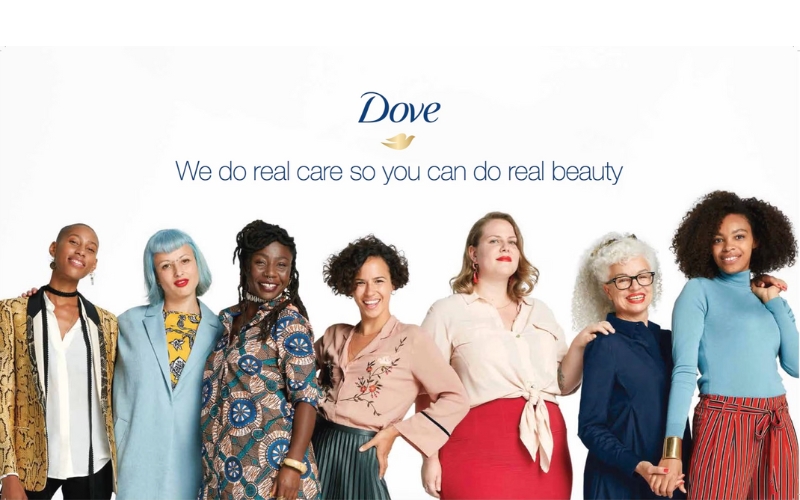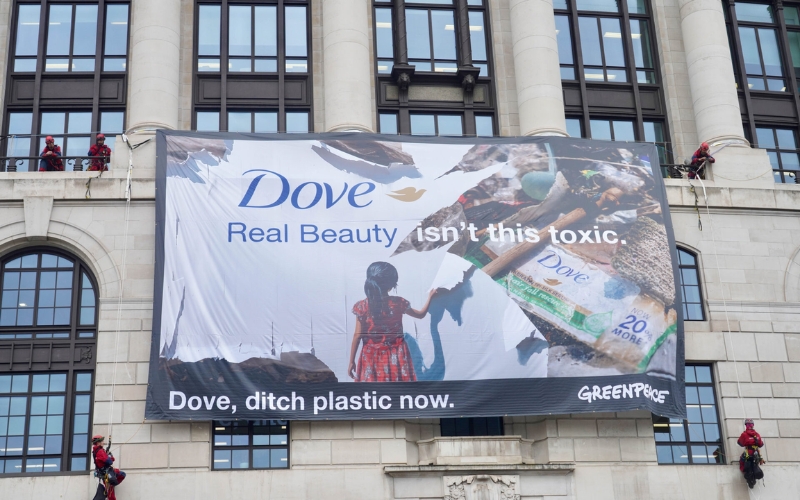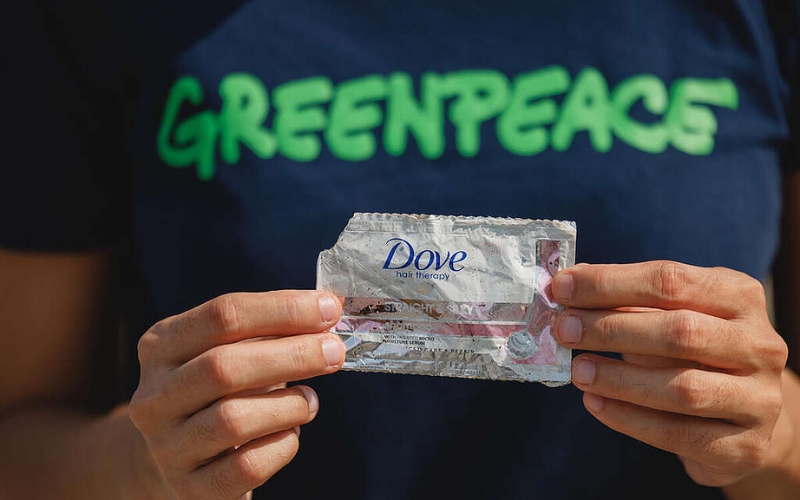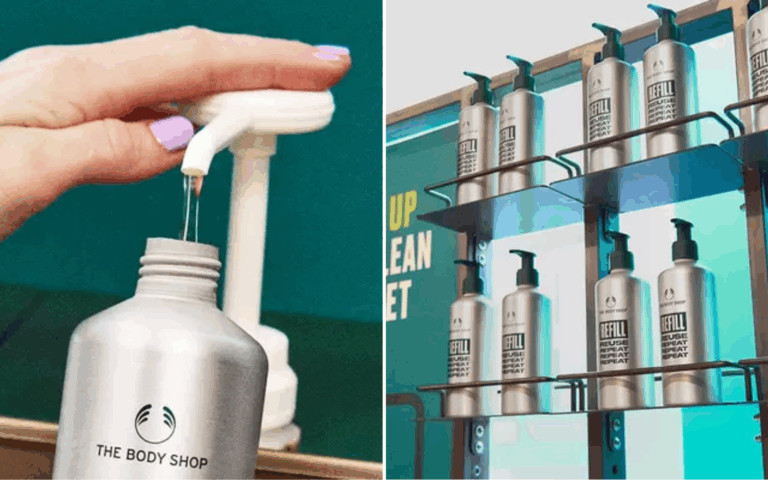As Dove celebrates the 20th anniversary of its iconic Real Beauty campaign, a dark cloud looms over the brand.
Greenpeace, through a new impactful campaign, highlights the negative environmental impact of the brand, creating a contrast with its image as a promoter of responsible beauty.
Proven Systems for Business Owners, Marketers, and Agencies
→ Our mini-course helps you audit and refine an existing brand in 15 days, just 15 minutes a day.
→ The Ultimate Brand Building System is your step-by-step blueprint to building and scaling powerful brands from scratch.
Table of Contents
About Dove’s ‘Real Beauty’ Campaign

Twenty years ago, Dove made waves in the creative industry with a powerful campaign aimed at promoting body positivity and self-acceptance among women.
Since 2004, the brand has launched several Real Beauty campaigns, with the objective to change traditional beauty standards by featuring real and diverse women in its advertisements. For example, in 2006 Dove released the anti-photoshopping film “Evolution”, that quickly went viral, showing a woman makeup-free, alongside a time-lapse of her transformation into a ‘supermodel’.
Dove has also conducted filmed experiments to inspire women to embrace their natural beauty – an example that comes to mind is the “Real Beauty Sketches” film. And since the rise of AI technologies, the brand has recently committed to never use AI to represent real women in its ads.
Real Beauty has become the brand’s signature program and the essence of its core purpose and vision.
“We believe beauty should be a source of confidence, and not anxiety. That’s why we are here to help women everywhere develop a positive relationship with the way they look, helping them raise their self-esteem and realise their full potential.”
Dove. Source
Greenpeace’s Campaign Against Dove: Beauty at What Cost?
Earlier this month, the activist network Greenpeace has launched a powerful campaign against Dove, called “Toxic Influence: The Dark Side of Dove“.
In its short film, Greenpeace features mothers and daughters who first say positive things about Dove – such as “When I think of Dove, I think of products that are good for the environment, good for your skin”, “Looking after your body, looking after yourself, feeling positive”, “Clean, healthy, and inclusive”.
But soon, they feel disappointed when they learn that the brand hurts the environment affecting the health of many people worldwide, which shows a disconnection between how Dove portrays itself and what Greenpeace reveals.
At the heart of Greenpeace’s campaign is the large amount of single-use plastic that Dove produces, particularly through its sachets and packaging. With over 6.4 billion sachets released into the market every year—12,000 per minute—the environmental consequences are alarming. These sachets do not just clutter landfills; they clog local waste systems, worsening flooding and pollution in countries like India, Indonesia, and the Philippines.
Greenpeace’s key message is that while Dove promotes empowerment, its actions contradict that message by harming the very communities it claims to support. Through this campaign, Greenpeace is asking Dove and its parent company Unilever to:
- Commit to stop the sale of sachets by the end of 2025.
- Phase out all single-use plastics within ten years.
- Become a true force for good by advocating for these goals at the UN Global Plastics Treaty.
We’re not here to shame Dove or its consumers. We’re here to challenge a brand to live up to its proclaimed values. We’re here to empower those who have been let down and those who have been directly impacted by Dove’s plastic waste. Dove say they care about ‘real beauty’? It’s time they prove it.
Greenpeace. Source
Is Dove’s Mission To Promote Real Beauty Wrong?
Dove’s commitment to real beauty is a beautiful one, that resonates deeply with many people worldwide. It’s a powerful purpose to have as a brand, and Dove has been successful in implementing this message across all touchpoints and over all these years, increasing brand loyalty and connection with their audiences.
Although Dove’s purpose is about women’s self-esteem and self-confidence, not about plastic pollution and the environment, it’s important to note that in the end, everything is interconnected. Purpose-led brands, in particular, are sending the message that they care about society. If they completely neglect other important sustainability issues, they face the risk of public backlash which can seriously affect their brand’s image and reputation.
Brands, including Dove, are not required to solve all the world’s problems, but they should take meaningful steps to enhance their social and environmental impact. For example, Dove could implement sustainable packaging, ensure ethical sourcing of ingredients, or support community programs that empower women.
Today’s consumers are not just looking for brands that stand for social causes; they expect them to practice responsible environmental stewardship as well. A lack of alignment between a brand’s purpose and its operational reality can affect trust and loyalty – even with topics that don’t seem connected at first (self-esteem vs. plastic pollution), as seen in the current scrutiny faced by Dove.
Steps Forward: How Dove Can Reclaim Its Narrative

To rebuild consumer trust and enhance its reputation, Dove must take immediate and meaningful action regarding its plastic production and analyze how the brand can keep improving its social and environmental footprint. Here are several strategies the brand could adopt:
- Set clear plastic reduction goals: Dove should establish ambitious targets to stop using single-use plastics and transition to alternative packaging solutions. For example, the brand could commit to stop the sales of sachets by the end of 2025, as suggested by Greenpeace. Dove could also partner with circular economy specialists to help them sell their products without single-use plastics (ex: selling products in solid forms to remove the need for packaging, switching to reusable or refillable options, etc).
- Partner with Greenpeace and other International Organizations to improve the brand’s operational impact and sustainability objectives.
- Develop a collaborative roadmap for the marketing and sustainability teams to identify opportunities for enhancing the brand’s actions while staying true to its core purpose
- Engage with affected communities: Partnering with those impacted by plastic waste to better understand challenges and develop solutions that genuinely support social responsibility. The brand could also invest in trash collection initiatives with the aim of reversing the negative impact as much as possible.
- Communicate its actions transparently: Openly sharing the brand’s challenges, actions, and results to demonstrate accountability and improve the brand’s image.
- Advocate for stronger policies: Leveraging its influence as a major player in the economy, Dove should advocating for stronger policies, suh as the UN Global Plastics Treaty, as suggested by Greenpeace.
This is an opportunity for the brand to reclaim its narrative and fulfill its promise to empower women—not just socially but also environmentally.
Conclusion: A Call for Inner Beauty Through Care for People and the Planet
Greenpeace’s campaign against Dove is as a reminder that brands must align their purposes with sustainable practices in order to maintain credibility in today’s market.
At this pivotal moment, Dove has the chance to not only rectify its external impact but also embody the inner beauty of genuinely caring for both people and the planet. By embracing sustainability as an integral part of its identity, Dove can prove that true beauty lies not only in self-empowerment but also in building a healthier world for future generations.
References
- Greenpeace International. (n.d.). If Dove won’t ditch plastic, it’s time we Ditch Dove. [online] Available at: https://www.greenpeace.org/international/act/ditch-dove/.
- UK, G. (2024). Uncovering Dove’s 20-year lie. [online] Greenpeace UK. Available at: https://www.greenpeace.org.uk/news/dove-anniversary-video/ [Accessed 27 Sep. 2024].
- Unilever (2024). 20 years on: Dove and the future of Real Beauty. [online] Unilever. Available at: https://www.unilever.com/news/news-search/2024/20-years-on-dove-and-the-future-of-real-beauty/.
- Dr. David Aaker explores the future of purpose-driven branding (2023) [online] ATLAS SkillTech University. Available at: https://atlasuniversity.edu.in/news/dr-david-aaker-the-father-of-branding-explores-the-future-of-purpose-driven-branding/ [Accessed 27 Sep. 2024].
- Cover image source: Greenpeace









![[object Object]](https://cdn.thebrandingjournal.com/wp-content/uploads/2024/06/Brand-Europe-Branding-768x480.jpg)